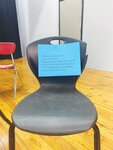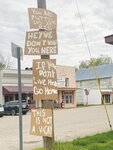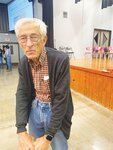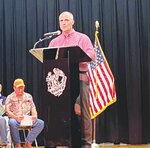





JASPER — After a town hall meeting last Thursday, proponents of turning public land around the Buffalo National River into a national park preserve said they would step back from the idea. The following day, a website touting the benefits of re-designating the land was taken down.
But opponents of the idea are not backing down and don’t trust that efforts to re-designate the land are no longer ongoing.
Misty Langdon, owner of Steel Creek Cabins, who organized the town hall meeting, said proponents have poured too much time, resources and money “into this project that seems to be linked to Bryan Sanders [Gov. Sarah Huckabee Sanders’ husband],” to just walk away.
In July 2022, the Runway Group approached U.S. Rep. Bruce Westerman, R-Ark., who represents Arkansas’ 4th Congressional District and chairs the Natural Resources Committee, with the idea of making public land around the river a national park preserve.
Grandsons of Walmart founder Sam Walton and co-founders of the Runway Group, Steuart and Tom Walton are investors in real estate, outdoor initiatives, conservation, recreation, hospitality and businesses in Northwest Arkansas.
Walton Enterprises currently owns more than 6,000 acres in Kingston in Madison County.
The Runway Group also has been linked with working with the governor’s office and the First Gentleman on the possibility of re-designating public lands.
Last Friday, Runway Group’s Vice President of Corporate and Community Affairs Krista Cupp said the group watched the town hall meeting. She reiterated they are not going forward with any proposal for re-designation. There are “no next steps,” she said.
“We wanted to explore a new idea for our home state together. However, this is not our decision to make. There is no new action being taken,” a statement issued earlier by the Runway Group said.
Cupp said when the group approached Westerman, it didn’t present a proposal to re-designate the land but simply asked if the idea was worth exploring.
Westerman, who had two staff members attend the town hall, issued a statement saying, in part, “Although it is in the purview of the House Natural Resources Committee to advance legislation to designate National Parks, I’ve made it clear I would not support any proposition that does not have grass roots support from those that live, work, and raise their families in the Buffalo River watershed.”
Westerman also said no plan to write or introduce any legislation re-designating land is underway.
“As the Representative for Arkansas’s Fourth Congressional District, my first priority is advocating on behalf of my constituents. I will continue to listen to the thoughts and concerns of Arkansans that would be impacted by any change in designation,” Westerman stated.
“The governor is strongly committed to protecting Arkansans’ property rights, hunting rights, and the Buffalo National River,” Alexa Henning, Communications Director for Gov. Sanders, said in a statement.
“She has had an informal conversation with Congressman Westerman but hasn’t seen a plan or taken a position, and doesn’t anticipate any re-designation moving forward in Congress at this time.
“The First Gentleman does not support nor has he even discussed the idea of drilling or mining in the Buffalo National River,” Henning stated.
“The purpose of the Natural State Initiative is to promote outdoor recreation and grow tourism and the outdoor economy, and the First Gentleman is deeply committed to protecting the Buffalo National River and the rights of Arkansans in one of the most beautiful areas of our state.”
In January 2023, Gov. Sanders signed an executive order establishing the Natural State Advisory Group and appointed Bryan Sanders as chairman. Tom Walton is one of the 18 members of the group. So far no meetings have been announced or open to the public, but the group has been active in exchanging e-mails regarding tourism and parks plans.
Langdon said she believes the group for re-designation will “work quietly in the background, but if they are planning to take a step back — we’re ready to take a step forward and we can tango.
“Because this re-designation nonsense has us ready to protect what we hold dear — our way of life.
“We have seen statements from Congressman Westerman that he would need to see the support of the locals in order to get on board with this re-designation and if the crowd at the town hall is any indicator —I feel the community has made its’ position clear.
“I feel like Runway, Bryan Sanders and anyone else involved should see the writing on the wall and find another swimming hole to play in,” Langdon said.
Town hall meeting
At the town hall meeting, speakers questioned what the potential land re-designation involved, lashed out at the results of a recently conducted survey about the potential change and stressed their desires to preserve their way of life.
They spoke to an overflow-capacity, standing-room only crowd of 1,200 people — more than double the town’s population — that packed the Jasper High School Auditorium. More than 500 people grabbed up Zoom invitations early in the day and 1,400 people watched a livestream by the Newton County Library.
Jasper School Superintendent Candra Brasel could not remember seeing a crowd that large in the school auditorium.
Langdon was originally planning for 75, but quickly determined the widespread interest called for a large meeting area.
“When we hear of people with outside interests who want to commercialize our land and pave over our way life, we get riled up, and rightfully so,” stated Langdon, who is the seventh generation of her mother’s family to live on the same farm and the ninth generation to live on the river.
Jasper Mayor Mike Thomas, who was acting as town-hall moderator, seemed to be the only non-committal person on the agenda. When asked where he stood on the proposal, he told The Record, “I’m smart enough to know I need more information.”
Thomas said he hoped the night would answer questions about the short- and long-term effects re-designating lands.
Langdon invited the Runway Group to speak also but last week, “Runway informed me that they would no longer participate in the meeting. This is unfortunate as with the others who were invited who chose not to appear.”
Langdon received “a call this morning from Runway wishing us well and asking me to make a comment on their behalf. However, I feel that a statement would be better coming directly from their team,” she said as the crowd cheered.
A reserved chair with names of some of those not attending, including the Runway Group, Gov. Sanders and Bryan Sanders, sat empty on the stage.
Seat at the table
After hearing about the proposed re-designation when The Record broke the story on Oct. 4, speakers stressed they felt left out of discussions.
Before the meeting began, Boone County Justice of the Peace Fred Woehl told The Record when the Buffalo River was designated as a national river, the government “took some of my land.”
In 1972, the river received the designation as the country’s first national river.
Woehl said he was “ok” with the government’s action because the river has been an asset, but he resents not having a say now.
“Ain’t nobody up here that tells Little Rock what to do,” Woehl said. “So Little Rock shouldn’t tell Newton County what to do.”
Woehl said he knew Sam Walton and his grandsons are 180 degrees different from Sam Walton.
“Sam is spinning in his grave knowing what’s going on. Sam and I were friends.”
Woehl then turned and faced the crowd and asked a Record reporter, “Do you see any people here on a bike?”.
He was referring to bike trails built by and the interest in biking by the Tom and Steuart Walton, who have invested heavily in trails in Madison County and throughout the state.
Jacque Alexander with Backcountry Horseman got the first of many interruptions for applause and cheers when she said, “All classes of citizens need to be heard, not just the people with a lot of money,” referring to the Waltons and their wealth.
The Walton family is considered the wealthiest in America, amassing a fortune of more than $245 billion, according to Forbes magazine.
Newton County has an average median income of approximately $42,000, according to the U.S. Census Bureau.
Gordon Watkins of Buffalo River Watershed Alliance said local people should have been involved in discussions from the beginning. He noticed large land purchases and thought, “Somebody is planning something.”
“If you don’t have a seat at the table, you’re on the menu,” he said.
Watkins was alarmed the Runway Group began discussions with Westerman rather than with people who live beside the river and on its tributaries.
Watkins recognizes the need to plan for future growth but wants to manage the current situation before bringing in more tourists, such as seeing trash picked up and toilets cleaned.
The Runway Group could use the re-designation as a marketing tool to increase economic development, Gordon said. Cupp said it always has been about economic development as well as community input and feedback.
Sen. Bryan King, R-Green Forest, who represents District 28, questioned the Runway Group’s transparency. “When everyone wants to take something, they’re not going to tell you,” King said.
King told the crowd the local people should have been informed from the beginning. “I know this train had been rolling down the tracks,” he said.
Jared Phillips, a writer, farmer and historian, who teaches at the University of Arkansas at Fayetteville, said he is tired of seeing land values triple.
“When do we as people from the hills get to sit at the table and have a say?” he asked “This is our home and we don’t get asked about it.”
Phillips said with the developments in the area, he feels less welcome. He feels the Waltons are “telling us regular folks in the Ozarks we’re in the way of what rich folks want to do.”
He also questioned why some elected officials chose not to attend the town hall, asking where they were and what could be more important. “Junior high football is almost over,” he said.
Poll Results
In September, in an effort to gauge public opinion, the Runway Group said it hired Selzer & Co., who polled 412 voters in Baxter, Madison, Marion, Newton and Searcy counties about a change in land designation and produced a flyer with the results.
Jasper native Wendy Finn, who lives on a farm that has been in her family for 123 years, went over results from the survey, poking holes in results, stating that the survey was flawed, and asserting it was confusing and not comprehensive.
Finn’s slide presentation viewed on large screens in the auditorium started with “technical difficulties,” that she “didn’t anticipate but we’re going to make this work as we do in Newton County,” which has limited broadband accessibility.
“They drew conclusions and put them on so-called, ‘fact sheets,’” Finn said of the survey.
She said the poll was confusing because people polled were left thinking, “What’s happening,” or “My head is spinning.”
Speakers also mocked the selection of those polled. King said people in attendance were a better representation of how people feel about the proposal rather than the Runway poll and stated the people who actually live in the watershed should have been polled.
Tourism
Langdon pointed out that the survey and information from Runway showed a potential increase in tourism from 1.5 million to 2.4 million, a 60% increase, which she said, “will change our landscape.”
Re-designating land will bring in more tourists increasing taxes and adding to economic growth in the area, according to those in favor of re-designation.
“You’re looking at positive economic impact, prolonging and protecting the national park, the national river, protecting what brings people here, so hunting, fishing, floating, all that. None of that changes. And that’s why it’s a national park preserve and not just a national park,” according to Austin Albers, president and owner of Buffalo Outdoor Center.
“So they’re seeing, not necessarily more river usage, but more people coming into the area, so more lodging, more restaurants, more purchases of fuel and using the services in the area,” he said in an earlier interview with The Record.
“It’s bringing more positive infrastructure to one of our poorest areas in the state,” Albers said.
The Buffalo National River saw a 6.5% increase in tourism during the Covid-19 pandemic. “This area is no stranger to the tourism industry,” she said.
Phillips said an increase in tourism makes land more expensive by increasing taxes and, “We have to leave.”
He also said an influx of tourists makes working in the area harder.
“Think of it if you’re trying to haul a trailer and have to get through a mess of tourists,” he said. “It’s getting to where you can’t work.”
Jack Stewart of the Audubon Society told The Record, “Sometimes we tend to love our special places to death.” He said people are fearful, “We’ll be overwhelmed with tourists and it will completely change the area.”
Preserve a way of life
Newton County resident Billy Bell, who worked as a resource protection ranger on the river for 13 years and for 20 years in resource management and protection, drew a standing ovation after he spoke.
“I am not for the re-designation of the Buffalo National River,” Bell emphasized and then paused. “Give me one minute. I’m very passionate about this at the moment,” he said, becoming emotional.
Bell drew a correlation regarding the song, “Rich Men North of Richmond,” and said in the current situation the lyrics could be, “Rich Men Not From Here.”
Bell said, “Rich men not from here brought the Buffalo National River into being using the battle cry, ‘Save the Buffalo River.’
“Rich men not from here recently decided what kind of farming we should or should not be able to do on our own land, also using the battle cry, ‘Save The Buffalo.’
“And today it appears rich men not from here are pushing to change our way of life once again.”
The crowd cheered and applauded when Bell said rich men were using the battle cry of “Save the Buffalo River” to spin public opinion and exploit the river “for their own personal gain.”
President of Newton County Farm Bureau Jack Boles also drew a groundswell of applause when he said his organization “opposes any name change to the Buffalo National River or expansion or re-designation.”
Going Forward
Stewart, along with Watkins, stressed the need for a plan of the area. Watkins said he hoped the justices of peace would work together to come up with a plan for management of the area’s growth.
“Without an agreed upon vision, it will be easy for some group to divide us and conquer,” Stewart said.
Attorney Brinkley Cook-Campbell, who grew up in Mt. Judea, said, “We have a pretty wonderful status quo going on,” that isn’t broken and doesn’t need to be fixed.
He then read a letter and encouraged others to get a copy to send to their representatives, senators and other elected officials.
Some parts of the letter read, “We want to raise our grandchildren to appreciate this area. We want to teach them to bottle feed a calf on the family farm. We want to take them floating on the Buffalo. We want them to be able to hunt and fish, to hike and to rock climb, and above all, we want them to love their fellow people and respect nature.
“‘National Park’ or ‘National Park Preserve’ status would mean an end to our way of life,” the letter said.
Comments
No comments on this item Please log in to comment by clicking here